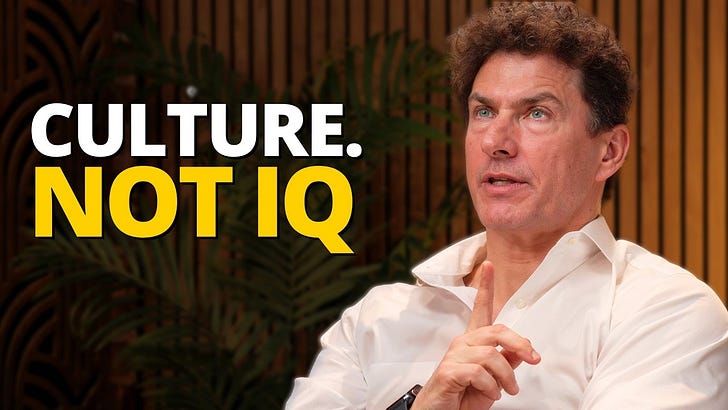
Joseph Henrich – Why Humans Survived and Smarter Species Didn't
🤖 AI Summary
Overview
This episode explores how cultural evolution, rather than raw intelligence, has driven human success. Joseph Henrich discusses the role of collective brains, the Catholic Church's dismantling of kinship systems in medieval Europe, and the psychological and institutional shifts that led to the Industrial Revolution. The conversation also delves into the implications of cultural evolution for modern challenges, including AI, declining fertility, and the loss of cultural diversity.
Notable Quotes
- Humans have always struggled to stay unified because geography and local learning naturally fragment us.
– Joseph Henrich, on the challenges of maintaining cohesive societies.
- The Catholic Church dismantled kinship systems for its own benefit, but in doing so, it accidentally set the stage for the Industrial Revolution.
– Joseph Henrich, on the unintended consequences of religious reforms.
- The internet should have caused more innovation, but there’s something special about face-to-face interactions that we haven’t fully replicated online.
– Joseph Henrich, on why digital connectivity hasn’t revolutionized innovation as expected.
🧠 The Role of Collective Brains in Human Success
- Henrich argues that humans thrive not because of individual intelligence but through cultural evolution and collective learning.
- Examples like European explorers failing to survive in environments where foragers thrived highlight the importance of accumulated cultural knowledge.
- The collective brain
grows with population size and interconnectedness, enabling societies to innovate and adapt.
⛪ The Catholic Church and the Industrial Revolution
- The Catholic Church’s bans on cousin marriage, polygyny, and ancestor rituals dismantled Europe’s intensive kinship systems.
- This shift led to smaller, nuclear families, increased mobility, and the rise of voluntary associations like guilds and universities.
- These changes fostered trust in strangers, urbanization, and innovation, laying the groundwork for the Industrial Revolution.
🌏 Why Some Civilizations Fell Behind
- Henrich contrasts Europe’s trajectory with China, India, and Rome:
- China: Large population but constrained by intensive kinship and centralized control, limiting innovation.
- India: The caste system stifled mobility and the use of genetic diversity for innovation.
- Rome: Despite its infrastructure, it remained clan-based and lacked the institutional shifts seen in medieval Europe.
- The church’s reforms uniquely dissolved tribalism in Europe, fostering a more interconnected collective brain.
🤖 AI and the Future of Cultural Evolution
- Henrich sees AI as a potential accelerator of the collective brain but warns of challenges:
- Serendipitous meetings and mistakes, crucial for innovation, may not translate well to AI systems.
- AI’s ability to instantly share knowledge could create unprecedented cultural learning, but it risks homogenizing creativity.
- He emphasizes the importance of integrating AI with human problem-solving to leverage human values and creativity.
📉 Declining Fertility and Cultural Variance
- Henrich highlights the global fertility decline and predicts that pronatalist ideologies or religions will eventually dominate cultural evolution.
- He warns of the loss of cultural diversity in the modern world, which could hinder humanity’s ability to adapt to future challenges.
- The fragility of weird (Western, Educated, Industrialized, Rich, Democratic) societies is a concern, as they depend on trust and cooperation that may erode without selective pressures like competition or war.
AI-generated content may not be accurate or complete and should not be relied upon as a sole source of truth.
📋 Episode Description
Humans have not succeeded because of our raw intelligence.
Marooned European explorers regularly starved to death in areas where foragers thrived for 1000s of years.
I’ve always found this cultural evolution deeply mysterious.
How do you discover the 10 steps for processing cassava so it won’t give you cyanide poisoning simply by trial and error?
Has the human brain declined in size over the last 10,000 years because we outsourced cultural evolution to a larger collective brain?
The most interesting part of the podcast is Henrich’s explanation of how the Catholic Church unintentionally instigated the Industrial Revolution through the dismantling of intensive kinship systems in medieval Europe.
Watch on Youtube; listen on Apple Podcasts or Spotify.
----------
Sponsors
Scale partners with major AI labs like Meta, Google Deepmind, and OpenAI. Through Scale’s Data Foundry, labs get access to high-quality data to fuel post-training, including advanced reasoning capabilities. If you’re an AI researcher or engineer, learn about how Scale’s Data Foundry and research lab, SEAL, can help you go beyond the current frontier at scale.com/dwarkesh.
To sponsor a future episode, visit dwarkesh.com/p/advertise.
----------
Joseph’s books
The WEIRDest People in the World
----------
Timestamps
(0:00:00) - Humans didn’t succeed because of raw IQ
(0:09:27) - How cultural evolution works
(0:20:48) - Why is human brain size declining?
(0:32:00) - Will AGI have superhuman cultural learning?
(0:42:34) - Why Industrial Revolution happened in Europe
(0:55:30) - Why China, Rome, India got left behind
(1:21:09) - Loss of cultural variance in modern world
(1:31:20) - Is individual genius real?
(1:43:49) - IQ and collective brains
Get full access to Dwarkesh Podcast at www.dwarkesh.com/subscribe
